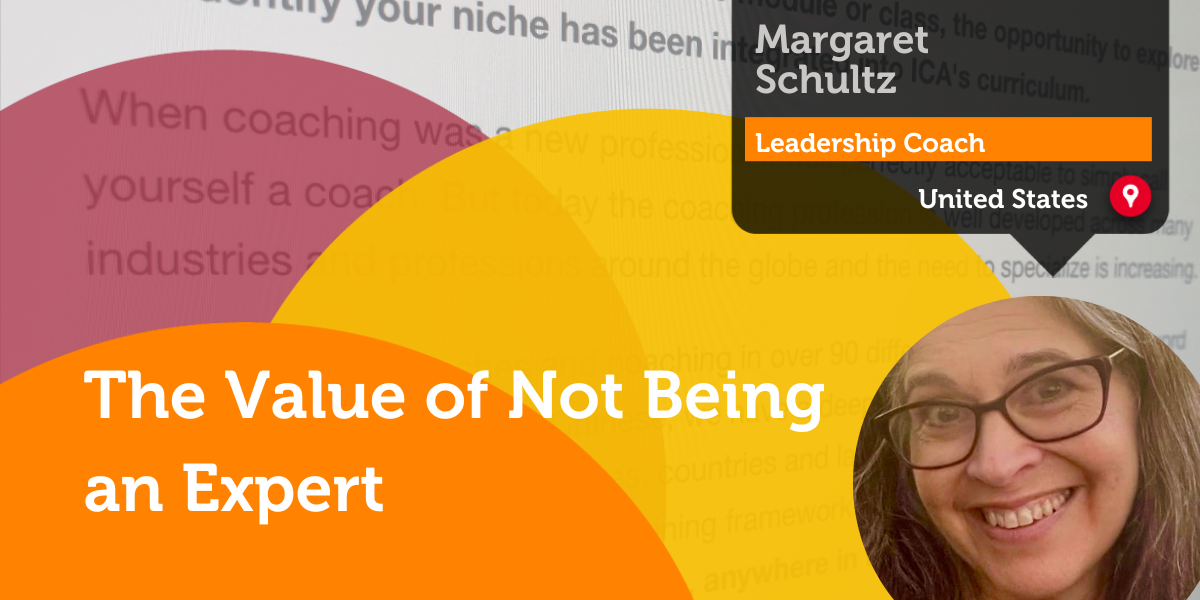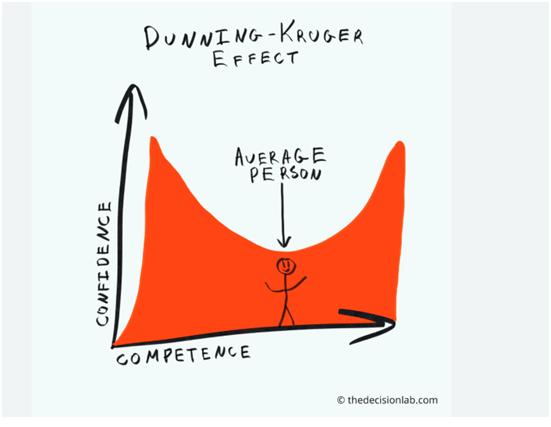A Research Paper By Margaret Schultz, Leadership Coach, UNITED STATES

The Need to Be an Expert
The first thing we learn when becoming a coach is that the client is the expert. On the ICA website, coaching is compared to driving a car. The Client is the driver, and the coach is in the passenger seat. We need to learn to not be a backseat driver, influencing the direction of where the client (or driver) is headed. Instead, we are there to support, even if we think we know better. In other words, we need to set any driving expertise we have aside. This makes sense and yet, I’m signed up for training and certification on how to be a coach. How do I become an expert coach but not be an expert as a coach? I wanted to explore this question and the value I can bring by setting aside the need to be an expert.
Over twenty years ago, I was a T-Group facilitator for a Stanford School of Business class. I was partnered with Steve, a more experienced facilitator for this 12-week class-Steve was like a guru of sorts. He had years of experience and knowledge that I did not. I was constantly feeling, less than, and insecure about my value. However, the feedback I got from the students at the end of the class, was that I was their“mama bear,” I held the space and kept it safe. The students felt held, and safe to share -they felt cared for and encouraged to bring their full selves…My training partner Steve was indeed looked at as the “expert, they looked up to him, while I provided safety and structure and a place they could grow without judgment. This memory has stayed with me, especially as I grapple with the value of being an expert.
The Value of Not Being an Expert
In “How Not to Be An Expert”, Cailin Minor shares their experience with Cognitive CoachingSM, a tool used for teachers that makes the argument that coach consulting doesn’t allow the ones you are working with to access their own internal abilities to reflect, or solve their own problems. They end up relying on you as the expert. The Cognitive CoachingSM model suggests using different tools to support the teachers to become self-directed vs dependent. The three recommended conversation types are planning, reflecting, and problem-solving. As a coach, you open the teacher’s thinking by asking questions, paraphrasing, and asking more questions as they work towards their own desired outcomes. Minor argues this type of coaching is far more effective and has become the preferred method used.
When asking ChatGPT the value of setting aside expertise, it brings up just what we’ve been learning through ICA (I wonder if that’s where they pulled this answer). Here are just a few of the recommendations, see if they seem a bit familiar to you:
- Adopt a growth mindset: Embrace the belief that intelligence and skills can be developed through learning and practice. Recognize that expertise is not fixed and that there is always room for growth and improvement.
- Practice active listening: When engaging with others, focus on actively listening to their perspectives and insights without immediately filtering them through your own expertise. Be genuinely open to understanding their viewpoints and consider the value they bring.
- Ask questions: Curiosity is a powerful tool for learning. Ask questions to deepen your understanding of a topic and to encourage others to share their knowledge and experiences. Approach conversations with a genuine desire to learn rather than to assert your expertise.
I am aware that ChatGPT is seen as cheating in many instances, but I really wanted to see what gets pulled from the internet on this topic. Not surprisingly, having a growth mindset, active listening, and asking questions pop up every time. I also read other articles and searched other coaching schools of thought. In the end, almost everywhere I looked agreed on these same values.
Marisa Silva wrote a great article on this topic called “Why I am Not an Expert”. She starts out by sharing the Dunning-Kruger Effect model (image borrowed from TheDecisionLab.com):

She states that it’s easy for people to say they’re an expert when they don’t know what they don’t know. And in general, as most people become more educated and experienced in their profession or area of study, they start to recognize how much they still don’t know. And to Silva’s continued point, who defines expertise? In any given area, we might all define it differently. She says, “I don’t believe in the single version of the truth.” So, the value of being an expert, and what defines an expertis pretty subjective. Silva is an educated professional in the field of Project Management. She is at the top of her field in almost every way and she remains pretty clear, she will not be calling herself an expert anytime soon.
Michael Gostelow, in a separate LinkedIn article aptly states, “Underneath the expert approach is the subtle message (to the client): you are not in charge.” When speaking as an expert, the client is off the hook for taking responsibility, you are doing the work for them and that eventually can feel debilitating. You are taking away their power.
My value as a coach is to hold a space for my clients, to ask questions, to actively listen, to reflect on what I am observing, and to check back in with more questions. My job is to hand over the lead to the client and support them in doing their best work for themselves. For all of this, I need to do my own work, study, research, and ongoing practice to bring the most value to my coaching clients. I do need to work to build expertise and learn as much as I can to best support those who ask for my coaching support.
Many years ago, I learned about a management style called Servant Leadership. The leader is in service of their employees vs the traditional top-down style of management. They trust their employees and assume they are competent at what they do, they lead by asking questions and actively listening, they solicit employee opinions and support their growth toward future leadership. In most studies, the evidence shows highly effective outcomes. It can increase motivation and morale, as well as profitability. The tools of Servant Leadership are like coaching. Instead of taking the lead, and acting as the one with all the answers, it assumes that everyone there has something to offer, and everyone has value. In coaching, we are also in service of our clients to assist them in where they want to go. This model of service is one of my key values regardless of role.
The Expert
I am relieved to not have to work toward the insurmountable goal of being “The Expert.” This goes for most roles in my life. For example, when will I become an expert parent? (Spoiler alert: Never). Before either of my kids was born, I read so many parenting books. And, as an older mom, I got to watch my siblings and friends’ parents before me, I learned a bunch of stuff that I agreed with and disagreed with…and then my baby arrived. And, with practice, and more practice, I felt confident I knew what I was doing most of the time. And then the next kid arrived, and it was different, and I had to re-learn how to parent in different ways. 20 years later, I am clear that with ALL the parenting experience I have, I am no expert, but I know I am an amazing parent to my kids. I am confident in that, even though I screw up and am far from perfect, I continue to show up for my children in whatever ways they each want me or sometimes don’t want me to show up (I am still learning).
There is value in lifelong learning and building expertise. Being certified in coaching brings value by building my competence and confidence in what I do. Continual practice also builds this expertise. I continue to learn from my peers and enjoy reading about coaching and coaching methodologies. The more I learn, the more I can put into practice. All of this helps me in my journey to being the best I can be for my clients. Carrying with me the value of servant leadership, genuine curiosity, and being willing to not know, I can let the client be the expert in their own life. Because they are.
References
How Not to Be The Expert: One Coach’s Experience with Cognitive CoachingSM By: Cailin Minor, Literacy Coach at The Columbus School in Medellin, Colombia
Poe-ChatGPT: searching: the value of not being an expert
Why I am not an expert, Marisa Silva, The Lucky PM
Dunning Kruger, Effect
The Expert vs The Coach, Michael Gostelow
The Art of Servant Leadership, By Mark TaralloMay 17, 2018